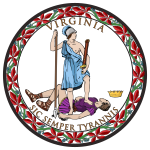| Elections in Virginia |
|---|
 |
Elections in Virginia are authorized under Article I of the Virginia State Constitution, sections 5–6, and Article V which establishes elections for the state-level officers, cabinet, and legislature. Article VII section 4 establishes the election of county-level officers. Elections are regulated under state statute 24.2-102. The Virginia State Board of Elections oversees the execution of elections under state law. In a 2020 study, Virginia was ranked as the 12th easiest state for citizens to vote in.[1]
Voters do not register by party in Virginia, and Virginia conducts open primaries where any voter may cast a ballot for either party. Traditionally, political parties could choose which nomination method to use for each election, with the option to either participate in the state-run primary or conduct a party-run convention.[2] A law which passed in 2021 and took effect in 2024, requires a party's method of nomination to make certain accommodations for absentee voters, had the practical effect of outlawing party-run conventions.[3][4]
In general elections, the party affiliations of local candidates do not appear on the ballot. Candidates for federal, statewide, and General Assembly offices appear on the ballot with party designations.[5] Besides the Democratic Party of Virginia and the Republican Party of Virginia, other parties include the Libertarian Party of Virginia, Constitution Party of Virginia, Green Party of Virginia, and the Independent Greens of Virginia. Third parties and independents have benefited from electoral reform in Virginia, especially streamlined ballot access, and have made their presence known by appearing on statewide ballots and even winning seats to soil and water conservation district boards.
In 2009, Governor Tim Kaine proposed to authorize no-excuse early voting in Virginia elections, noting that 26 other states allow it.[6] On January 26, 2009, the bill passed the Democratic-controlled Senate.[7] However, the Republican-controlled House of delegates killed the proposal.
Governor Kaine worked with a coalition of civic groups to work to restore the voting rights of felons who were convicted of non-violent crimes in the past. Kaine's staff reviewed each individual application from felons who had been out of prison for at least five years without an additional conviction. An estimated 366,000 Virginia citizens are disenfranchised due to a prior felony conviction.[8]
- ^ J. Pomante II, Michael; Li, Quan (December 15, 2020). "Cost of Voting in the American States: 2020". Election Law Journal: Rules, Politics, and Policy. 19 (4): 503–509. doi:10.1089/elj.2020.0666. S2CID 225139517.
- ^ Sabato, Larry J.; Kondik, Kyle; Skelley, Geoffrey (May 20, 2013). "So what just happened in Virginia?". Sabato's Crystal Ball. Retrieved October 17, 2024.
- ^ Beyer, Elizabeth (May 23, 2024). "Bad news for Bob Good: New law upends Virginia's 5th District primary". The News Leader. Retrieved October 17, 2024.
That law, which went into effect in January, had one unintended consequence: It all but outlawed conventions in any election, including party primaries, in Virginia.
- ^ Matherly, Charlotte (January 26, 2024). "Lynchburg Republicans to test Virginia's new law on primaries". Cardinal News. Retrieved October 17, 2024.
- ^ Va. Code § 24.2-613
- ^ http://www.southernstudies.org/2009/01/voting-rights-virginia-governor-pushes-for-no-excuse-early-voting.html Archived September 27, 2011, at the Wayback Machine Retrieved February 8, 2009.
- ^ Walker, Julian (January 26, 2009). "Virginia Senate approves no-excuse absentee voting". Virginia Pilot. Retrieved February 8, 2009.
- ^ "Number of People by State Who Cannot Vote Due to a Felony Conviction - Felon Voting - ProCon.org". Felon Voting. Retrieved October 16, 2024.
